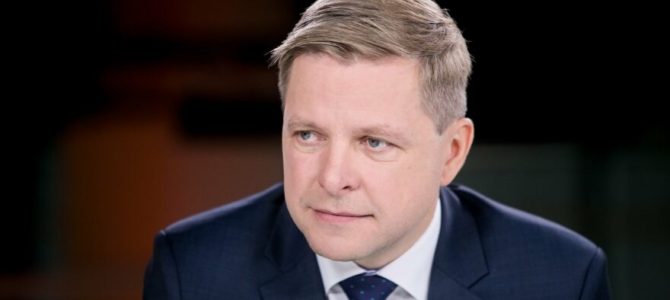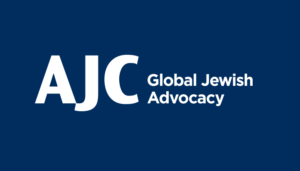At an American Jewish Committee (AJC) reception, Vilnius Mayor Remigijus Šimašius was praised for his efforts to correct the narrative around Lithuanian complicity in the Holocaust.
Earlier this summer, Šimašius oversaw two important decisions regarding Holocaust memory in Lithuania. The first was changing the name of a street honoring Kazys Skirpa, founder of the Lithuanian Activist Front (LAF) resistance organization, and the second was removing a plaque honoring Jonas Noreika, an anti-Soviet fighter who was responsible for the imprisonment of Šiauliai Jews and seizure of their property during the Holocaust.
Those decisions sparked an intense backlash against the mayor and Lithuania’s International Historical Commission, whose authoritative reports served as the basis for the mayor’s actions. Right-wing, populist Lithuanian groups protested, mainstream politicians were largely silent, and even recently elected President Gitanas Nausėda avoided the controversy by calling for “a moratorium on erasing historic memory.”
“Twenty years ago, people in Lithuania were ignorant,” said Rabbi Andrew Baker, AJC Director of International Jewish Affairs, and a regular visitor to Vilnius. “They saw themselves as victims of Communism and did not realize that some of the anti-Soviet fighters they admired were also complicit in the murder of Jews. But now with the benefit of an accurate historical accounting they know better. So, when they honor people like Noreika and Skirpa, they are also saying that their antisemitism just doesn’t matter.”
Mayor Šimašius, reflecting on his decisions, said, “It’s clear that their (Skirpa and Noreika) participation in the Holocaust was not an accident. It’s not about plaques or street names, but about principles.”
In addition to sharing his personal reflections about his family’s experience during the Holocaust, and the complexity around dealing with Holocaust memory, Šimašius expressed gratitude for the U.S. military serving on Lithuanian soil.
Cherrie Daniels, U.S. Special Envoy for Holocaust Issues, praised the mayor’s use of the findings of the International Historical Commission. “It takes courage in any country to look at one’s own past and one’s own heroes with an objective eye and honestly assess the impact that that person had, for good and for bad,” said Daniels. “The best we can do is honestly assess that past, even the unsavory parts, and use those lessons in Holocaust education.”
In 1998, AJC’s Rabbi Baker was invited to a summit meeting of the three Baltic State Presidents and proposed that they establish international historical commissions that would offer a critical and objective accounting of the Holocaust in each country. These countries were annexed by the Soviet Union in 1944, even before the Second World War had ended, and there had never been any real examination of the role local collaborators played in the murder of their Jewish neighbors. Lithuania’s commission was established in 1998.
Paul Packer, Chairman of the U.S. Commission for the Preservation of America’s Heritage Abroad, commended Šimašius’s efforts to revive Jewish cultural heritage in Vilnius, noting the great collaboration the commission has enjoyed with the mayor’s office.
Carl Gershman, President of the National Endowment for Democracy, commended the mayor’s pursuit of truth in the face of a complex political situation. “There aren’t many people around the world standing for truth, standing on principle. the fact that you’re raising this standard has enormous significance,” he said.
Heather Conley, former U.S. Deputy Assistant Secretary of State and now Senior Vice President for Europe, Eurasia, and the Artic and director of the Europe Program at CSIS, lauded the mayor’s political courage, noting the key role that Holocaust issues played in NATO accession talks for Central European countries.
And B’nai B’rith International CEO Daniel Mariaschin noted the mayor’s “tremendous contribution to strengthening the relationship in a very honest way between Lithuanians and Jews.”
Emanuelis ZIngeris, a long-time Member of the Lithuanian Parliament and Chairman of the International Historical Commission, addressed the gathering by video from Vilnius.



